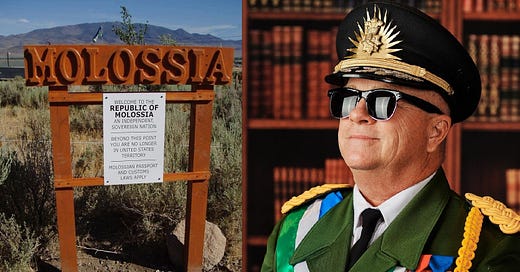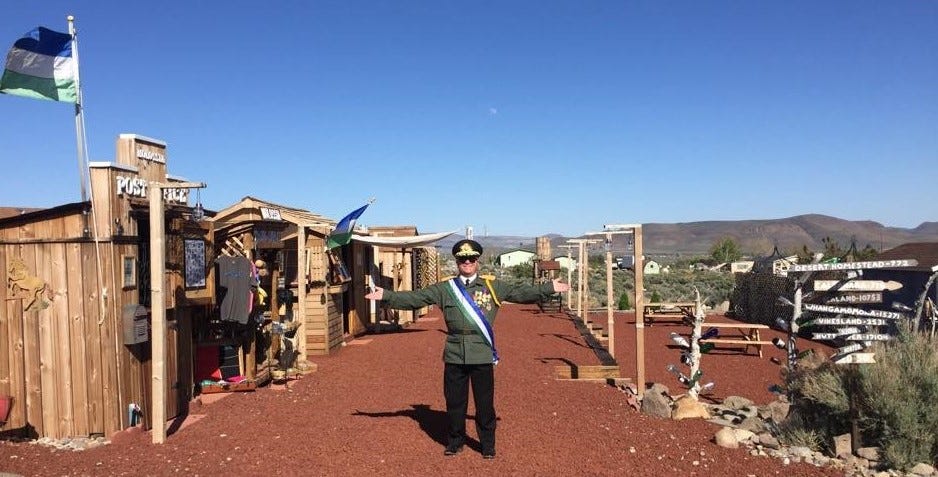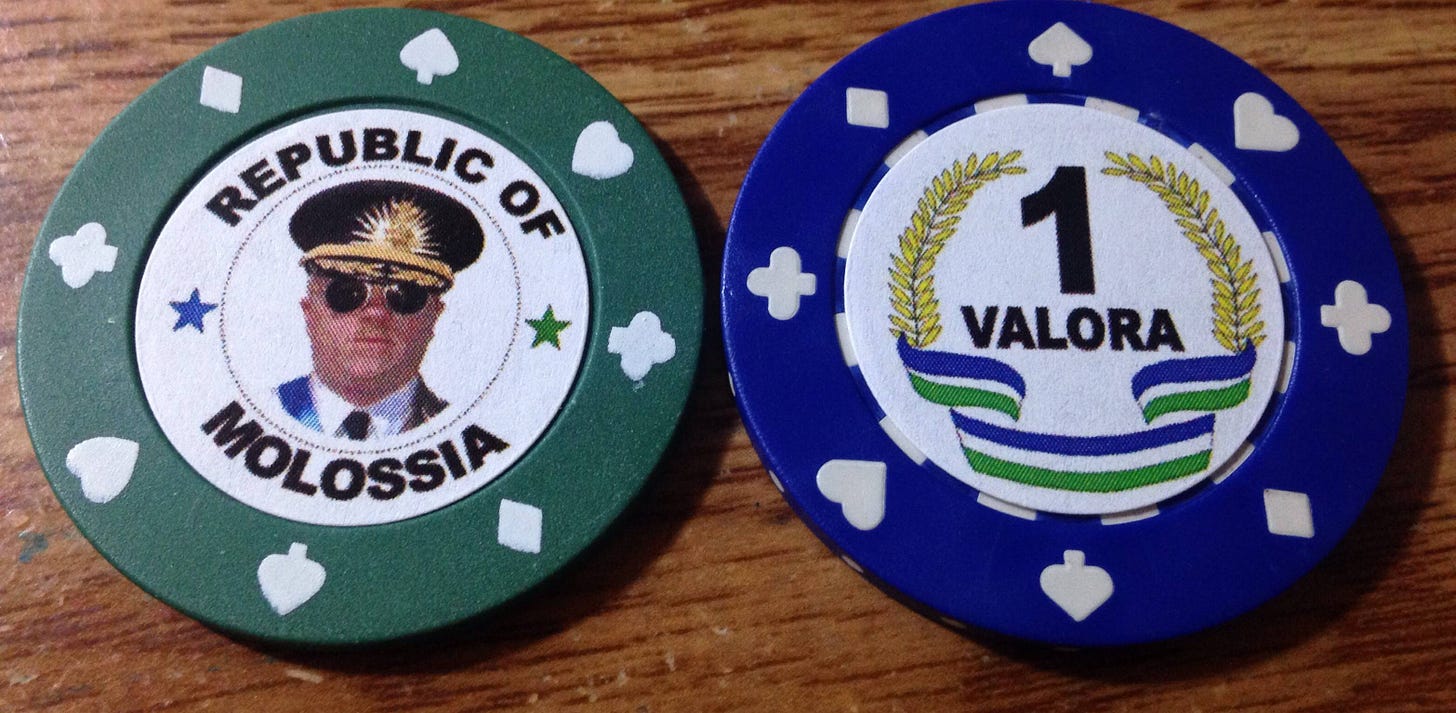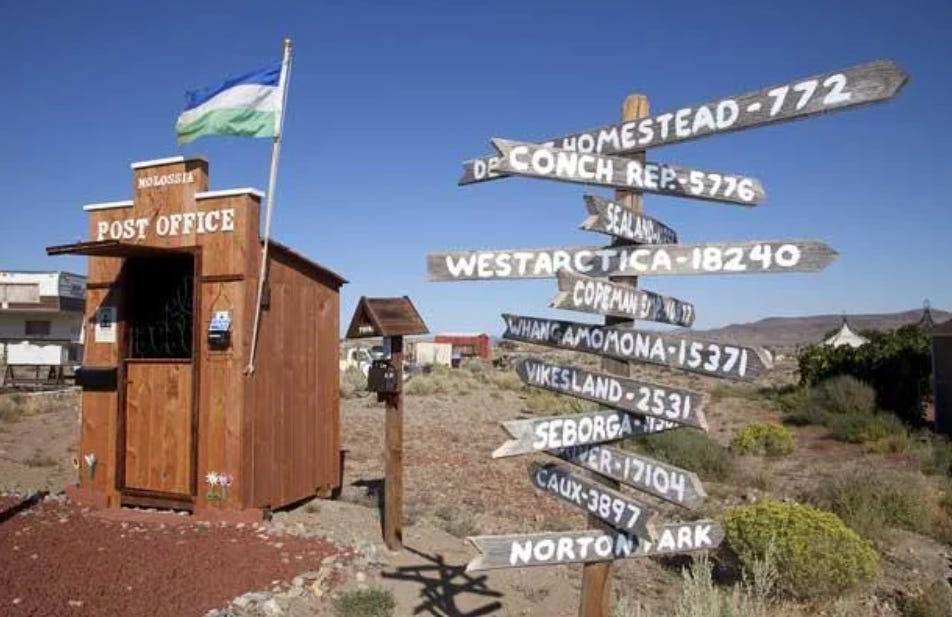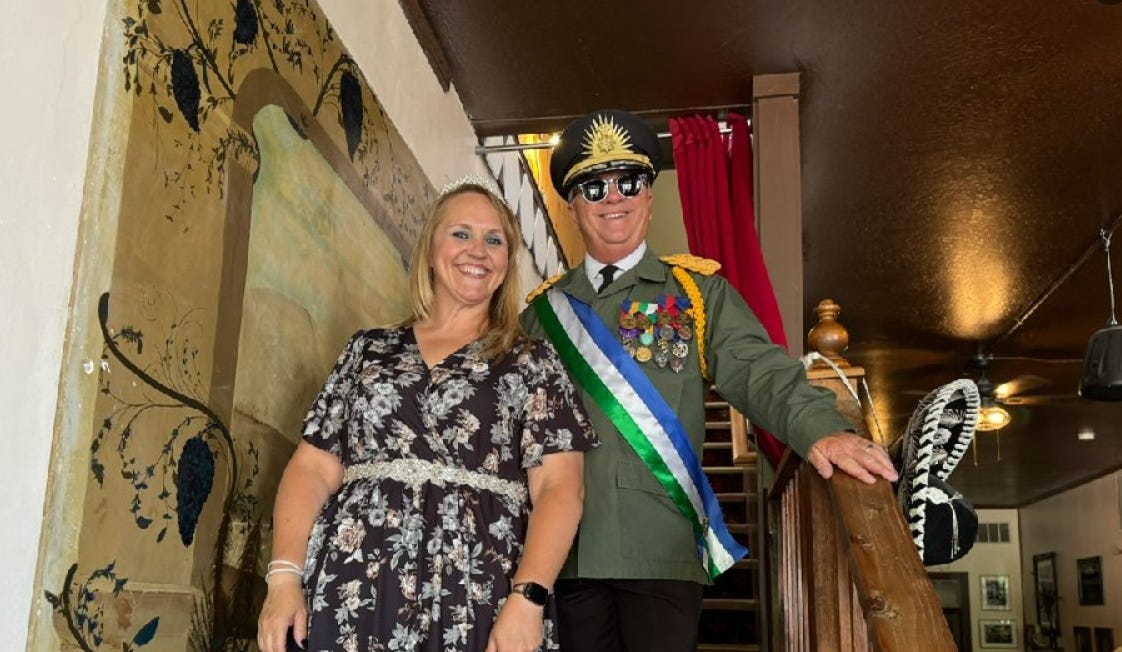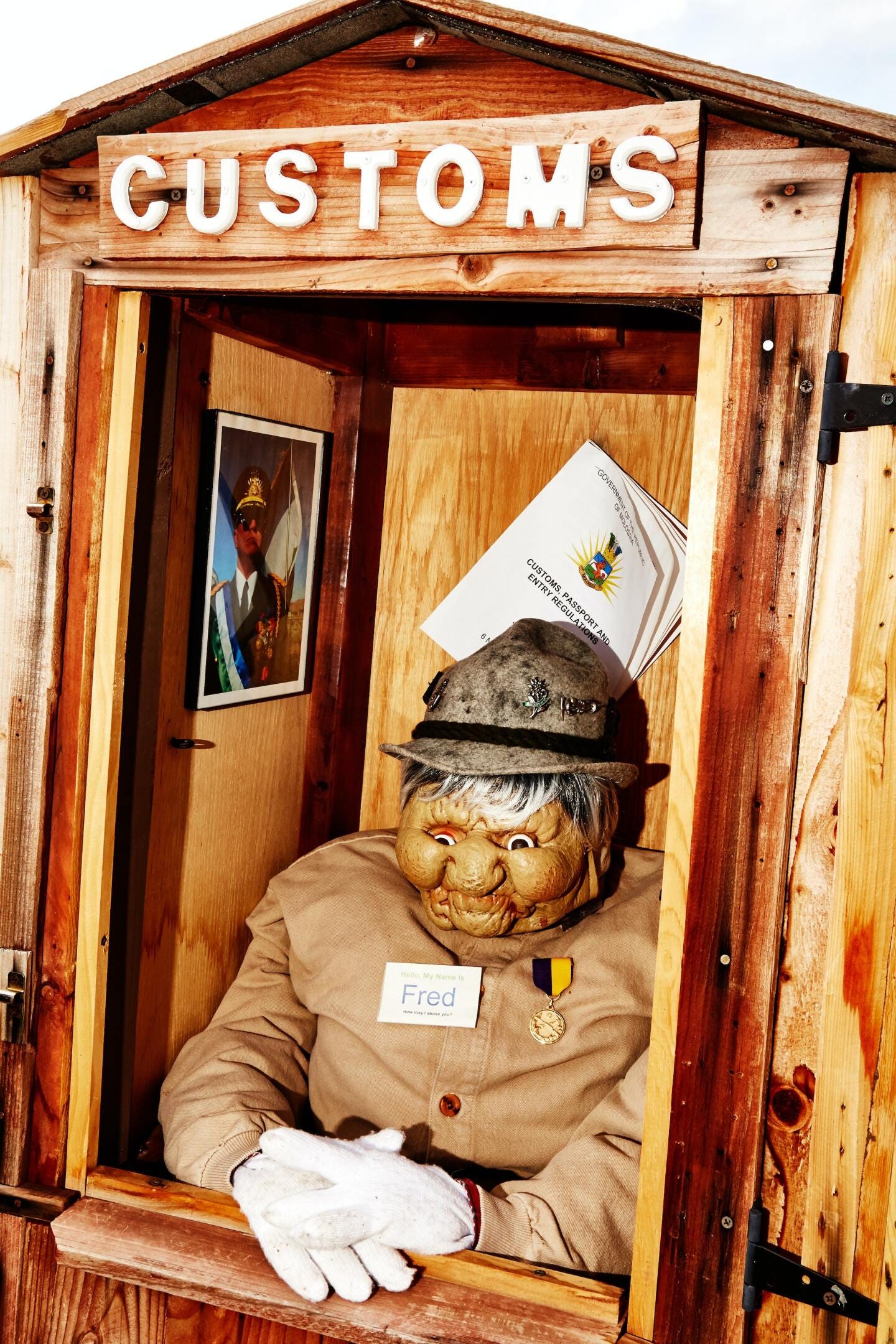How to Start Your Own Country
A handy guide to independence from the Supreme Leader of Molossia
Inside everyone is a little dictator.
Not the bad kind of dictator, who commits human rights abuses and invades other countries. A dictator in the general sense; somebody with absolute power who makes all major decisions with impunity. Of course, real life doesn’t work like that. We don’t always get our way, and sometimes other people refuse to recognize our infallibility.
Unless your name is Kevin Baugh. Or as he prefers to be called, His Excellency Kevin Baugh, the president and Supreme Leader of the Republic of Molossia. For Baugh, what he says pretty much goes, at least in Molossia.
Don’t bother looking for Molossia on a map. You won’t find it, as the United States doesn’t officially recognize its existence. The border is about an hour outside Reno, on a stretch of Nevada desert that’s so remote and eerily quiet it’s like being on another planet.
Pulling up to the front gates of Baugh’s property—he’s got around one and a half acres of land—it looks like any other desert home: a single-floor house surrounded by shacks and a gate that couldn’t keep any determined intruders out. But then you notice the entrance sign, announcing “Beyond this point, you are no longer in United States territory.”
Baugh is out front to greet his visitors, and as always he’s dressed in full military regalia. He wears a peaked cap, a tan naval jacket covered in medals (which he’s awarded to himself), and a tricolor sash with the country’s national colors—white, blue, and green—the same as the flag flying proudly over the border.
“Welcome to Molossia,” he says, reaching out to deliver a vigorous handshake like he’s greeting a foreign dignitary. “May I see your passport?”
He’s not kidding. Passports for all foreigners are inspected and stamped. I’m also informed which items are strictly prohibited within Molossia: no firearms, tobacco, incandescent lightbulbs, or plastic shopping bags are allowed. Oh, and American dollars are useless here. If you want to purchase anything during your stay—guests can only visit Molossia for a maximum of three hours—you’ll have to convert your cash to Valora, the national currency, which are just poker chips from a local casino adorned with portraits of the Supreme Leader’s face.
If it seems like satire, you’d be half right. Baugh has a sense of humor about his so-called sovereign nation. “We try to keep it light and funny, so we don’t have the U.S. government rolling up on our doorstep and throwing us all in jail for being seditious,” he says. “But at the same time, we view our nation as a nation. We have everything a larger, established country has but in a small package.”
As he leads me through Red Square—the public area open to immigrants and day-trippers—it becomes apparent that Molossia is more than just a guy with a dictator costume and a flag. He’s built an entire self-contained infrastructure, including a post office (which sells stamps featuring Baugh’s likeness), a national bank, a park service, a national railroad (actually just a model set), and several industries (a general store and a tiki bar).
There’s a Molossian national anthem, which Baugh will happily sing to you (“Where hawks and Mustangs roam/ Fair Molossia is our home”). They (he?) is embroiled in at least one international dispute, a longstanding war with East Berlin—or more specifically, the Ernst Thälmann Island off the coast of Cuba, still technically a part of the former Deutsche Demokratische Republik. (Baugh didn’t pick the island randomly from a map. He first declared war in 1983, after an unpleasant visit to the island while serving in the military.)
Molossia even has a navy. Yes, a navy… in the desert. “We consider it to be a navy,” Baugh adds. It’s just an inflatable kayak “but it gets around,” he says. “It goes on the water.”
The country, which Baugh admits is still a “third-world nation,” has been around for exactly forty years. It was founded on May 26, 1977, in Portland, Oregon, when Baugh was just fifteen years old. He and a high school pal, James Spielman, watched the Peter Sellers comedy The Mouse That Roared, about a tiny country that goes to war with the U.S. assuming they’ll lose.
“Because if you lose a war with the U.S., they come over and fix up your country,” Baugh says. “But they somehow end up winning.”
Baugh and his friend were intrigued with the idea and launched their own micronation, the Grand Republic of Vuldstein. They shared governing duties—“He was the king and I was prime minister,” Baugh says—until the other guy moved to another high school and lost interest, gravitating toward activities like sports and girls.
But Baugh stuck with it, and when he and his (now ex) wife bought property in Dayton, Nevada, in 1998, Molossia found its official home.
Today, Molossia has a population of thirty-three citizens, including his new wife, Adrianne, seven children (both together and from their respective marriages), two grandchildren, various relatives living outside Molossia proper (whom Baugh calls “expatriates”), and several dogs. A cat resides in the country but hasn’t been granted citizenship because Baugh considers cats “untrustworthy.”
First Lady Adrianne, a marketing manager at a nearby casino, has known Baugh since 2009 (they met on an online dating site) and married him in 2011. She’s a relative newcomer to Molossia, but was well aware of Baugh’s lifestyle choice when they started dating.
“She knew what she was getting into,” he says. “She came into this relationship with her eyes open. She knew she was getting a guy who had his own country and it was a very important part of my life. It is my life. It’s not like a stamp collection that you can put away.”
It’s become a part of Adrianne’s life, too. She doesn’t hide in the house when curiosity seekers show up. She eagerly plays the role of Molossia’s First Lady, leading tours and answering questions (she read all five hundred pages of Baugh’s guide to his country after just their first few dates) and standing by his side during public events like parades in nearby towns.
She’s not afraid to flex her muscles when it comes to questions of national identity. When Baugh suggested changing the national animal from the wild horse, which had become increasingly rare in the area, to a desert rabbit, Adrianne made no secret of her displeasure.
“She shot that down pretty quick,” Baugh remembers. “She said, ‘No, we’re not gonna be doing the rabbit thing.’”
Probably the strangest thing about Baugh is just how normal he is. Other than the military uniform, there’s nothing about him that comes across as especially crazy. He’s soft-spoken and equanimous, like the dad character from a John Hughes film. You wait for a slip of the tongue, some evidence that Baugh’s innocent-seeming pastime has dark motives. But he never talks of “government conspiracies” or “what the corporations don’t want you to know” or even a passing mention of “fake news.” If Baugh has any political opinions, he isn’t sharing them.
“I think the United States is great,” he says with a broad smile. “I think things are going just fine over there. I’m more optimistic about the U.S. than most Americans seem to be.”
Baugh insists that he still pays federal and state taxes, which he describes as foreign aid—“We’ve seen their roads,” he says. “They need all the help they can get”—and the Baugh family get all of their groceries (which are called, you guessed it, “imports”) on the outside.
His kids go to school in the United States too, as does his garbage. Most of the things people need to survive—electricity, medicine, clothes—are purchased on so-called foreign soil. If it seems like a slippery slope, Baugh agrees, and he doesn’t care.
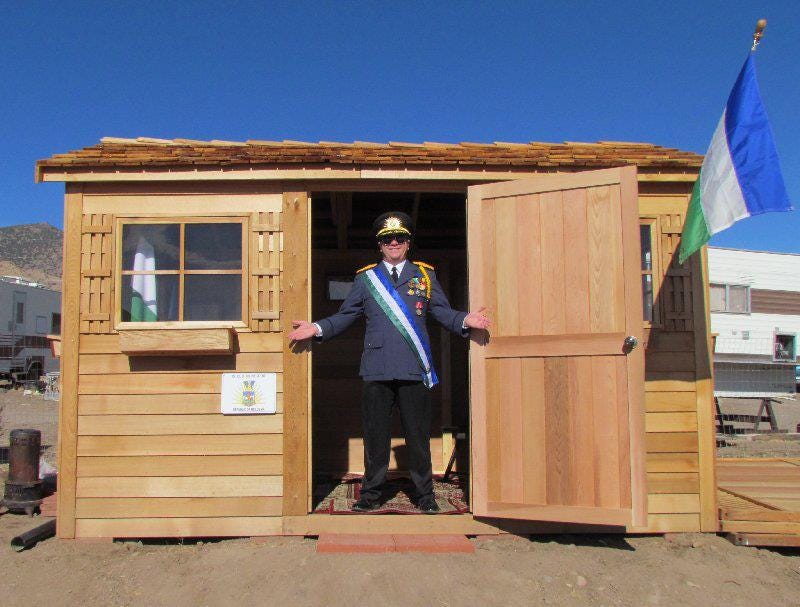
He dismisses suggestions that he run for mayor in any of the small Nevada towns nearby. “It sounds like a lot of meetings and compromise,” he says. “I make most of the decisions in Molossia myself. As the president and the dictator, I don’t have to run anything past a committee.”
The best analogy for what he’s doing, Baugh explains, is a kid declaring his bedroom an independent country so he doesn’t have to clean up his dirty clothes. That kid is obviously in no way independent. He’s not paying the mortgage, his meals come from Mom and Dad, and he can’t even leave the house without borrowing their car. But it feels like freedom.
“For me, what I’m doing is an extension of that kid in his bedroom,” he says. “It’s my way of saying, ‘I want to do things my way.’ Molossia is an exercise in personal sovereignty.”
It’s a little insane, sure. But it’s also a perfect expression of every person’s id. Who wouldn’t want to create their own laws based on their personal likes and dislikes—spinach is outlawed in Molossia, as are catfish and salespeople—or invent holidays for their favorite pets—February 4th is Jack Day, in honor of the late First Dog. In Molossia, Baugh has created reality as he prefers it.
His country is also more progressive than the bigger, more official nation that surrounds it. Same-sex marriage has been legal in Molossia since 2002, 13 years ahead of the United States.
Baugh takes us to his presidential office, which is decorated with Molossian flags, a single black phone on a desk, and framed photos of His Excellency posing with, among others, the late actor James Doohan, who played Scotty on Star Trek, pop star Kelly Clarkson, and comedian Doug Walker, who in 2010 invaded Molossa with a small army and briefly renamed it Kickassia. (The photo is signed “Thanks for letting us invade you… and failing.”)
Baugh sighs as he looks out the window at his country—he can see almost all of it from his office, a rarity for an autocrat—and wonders aloud how long he can keep this up. “Being a dictator is kind of a money pit,” he admits. “Especially when it’s something this small, and you don’t have any taxpayers and you’re paying for everything out of your own pocket. We have to do it all on a shoestring budget.”
He’s got seven kids who could theoretically take it over, assuming they want anything to do with it. Only Alexis, his youngest daughter at 14 years old, still lives in the country, and besides her mom, she’s the only family member with an official state role—she’s the Chief Constable and isn’t shy about checking the belongings of suspicious-looking tourists. But it remains to be seen if she’ll have any ambitions to take over the family business someday.
“I want Molossia to outlive me,” Baugh says. “I know it’ll change. No country stays the same. Nations evolve. The United States today doesn’t resemble what the founding fathers imagined. I hope Molossia is still around in two hundred years, and I’m well aware that it’ll be a different thing. It has to be.”
The sun starts to set and Baugh tells me it’s time to leave. He’s got a family meeting to attend, and he doesn’t want to miss it. He won’t divulge details, but he looks worried. I ask if he’s ever been concerned about an uprising, either nonviolent or a full-on coup, but he dismisses the idea with a wave.
“There’s always going to be a little grumbling,” he says. “But it’s easy to make everybody happy in Molossia. If there’s any civil unrest, I just order out for pizza.”
I can’t tell if he’s kidding, but he doesn’t crack a smile.
“Think of how much happier America would be if there were more pizza parties,” he says. “There would be no more red states or blue states if somebody said, ‘Let’s all have pizza, and what the heck, we’ll have ice cream afterward.’ ”
He escorts me toward the exit, and after offering a final handshake, he straightens his sash, adjusts his military cap, and marches back across the dusty yard of his nation toward the one-story house where his loyal subjects are waiting—two very patient women, some unsurprisingly obedient dogs, and a cat who can’t be trusted.


